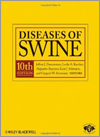April, 2012 news
April 23rd, 2012
Via publiDB
Clonal diversity of Staphylococcus aureus originating from the small ruminants goats and sheep
Investigation published in Veterinary Microbiology
Staphylococcus aureus is an important pathogen in humans and many animal species. The prevalence of different clonal types in animal species remains largely unknown. We analyzed 267 S. aureus from intramammary infections in goats (47) and sheep (220) by spa typing, multi-locus sequence typing (MLST) and antimicrobial susceptibility. The most frequent spa types in goats were t337 (N=9), t759 (N=6) and t1534 (N=5). Sheep isolates mainly belonged to spa types t1534 (N=72), t2678 (N=29) and t3576 (N=20). Eighteen novel spa-types were observed; two from goat strains, 13 from sheep and three in both…
Read more
April 21st, 2012
Via publiDB
Visita guiada a un laboratorio de alta seguridad biológica. Programa de Enriquecimiento Educativo para Alumnos con Altas Capacidades
Communications in this event:
- Utilidad de la biología molecular en las Ciencias de la Salud
- ¿Cómo se trabaja y para qué sirve un laboratorio de alta seguridad biológica?
April 13rd, 2012
Via publiDB

VII Jornadas Complutenses, VI Congreso Nacional de Investigación para Alumnos Pregraduados en Ciencias de la Salud y XI Congreso de Ciencias Veterinarias y Biomédicas
Communications in this event:
- Termografía aplicada al diagnóstico de gestación en jirafas
April 12nd, 2012
Via publiDB
Resistencias a antibióticos: se nos acaba el tiempo
Oral communication in Ciclo de seminarios IBVF 2012
April 10th, 2012
Via publiDB
El virus Schmallemberg
Conference in Ciclo Los Debates del Colegio-Colegio Oficial de Veterinarios de Toledo 2012
April 1st, 2012
Via publiDB

Factors driving the abundance of ixodes ricinus ticks and the prevalence of zoonotic I. ricinus-borne pathogens in natural foci
Investigation article published in Applied and Environmental Microbiology
Environmental factors may drive tick ecology and therefore tick-borne pathogen (TBP) epidemiology, which determines the risk to animals and humans of becoming infected by TBPs. For this reason, the aim of this study was to analyze the influence of environmental factors on the abundance of immature-stage Ixodes ricinus ticks and on the prevalence of two zoonotic I. ricinus-borne pathogens in natural foci of endemicity. I. ricinus abundance was measured at nine sites in the northern Iberian Peninsula by dragging the vegetation with a cotton flannelette, and ungulate abundance was measured by mea…
Read more
April 1st, 2012
Via publiDB
Characterization of the immune response induced by a commercially available inactivated Bluetongue virus serotype 1 vaccine in sheep
Scientific World Journal publish this investigation article
The protective immune response generated by a commercial monovalent inactivated vaccine against bluetongue virus serotype 1 (BTV1) was studied. Five sheep were vaccinated, boost-vaccinated, and then challenged against BTV1 ALG/2006. RT-PCR did not detect viremia at any time during the experiment. Except a temperature increase observed after the initial and boost vaccinations, no clinical signs or lesions were observed. A specific and protective antibody response checked by ELISA was induced after vaccination and boost vaccination. This specific antibody response was associated with a significa…
Read more
April 1st, 2012
Via publiDB
Detection of Methicillin Resistant Staphylococcus aureus in Iberian pigs
Investigation published in Letters in Applied Microbiology
Aims: Iberian pigs are bred in Spain for production of high-value dry-cured products, whose export volumes are increasing. Animals are typically reared outdoors, though indoor farming is becoming popular. We compared carriage of Methicillin Resistance Staphylococcus aureus (MRSA) in Iberian pigs, raised indoors and outdoors, with intensively farmed Standard White pigs. Methods and Results: From June 2007 to February 2008, 106 skin swabs were taken from Iberian pigs and 157 samples from Standard White pigs at slaughterhouses in Spain. We found that Iberian pigs carried MRSA, though with …
Read more
April 1st, 2012
Via publiDB
Quantitative Risk Assessment for the Introduction of African Swine Fever Virus into the European Union by Legal Import of Live Pigs
Transboundary and Emerging Diseases publish this investigation article
The recent incursion and spread of African swine fever virus (ASFV) in the Russian Federation and Caucasus region, close to European Union (EU) borders, have increased the concerns regarding the probability of ASFV introduction into the EU. There are many potential routes of ASFV entry into EU, but here we specifically aimed to assess the probability of ASFV introduction by legal trade of pigs, which historically has been one of the most important ways of exotic diseases introduction into the EU. A stochastic model was used to estimate the monthly probability of ASFV introduction for each coun…
Read more
April 1st, 2012
Via publiDB

Progress in molecular typing of Mycobacterium avium subspecies paratuberculosis
Investigation published in Research in Veterinary Science
Mycobacterium avium subspecies paratuberculosis (M. a. paratuberculosis) is responsible for paratuberculosis or Johne`s disease, a chronic inflammation of the gastrointestinal tract in different animal species. Some studies have also established a link between this microorganism and Crohn`s disease in humans. Although, M. a. paratuberculosis is a difficult microorganism to cultivate in the laboratory (occasionally is non-cultivable), a proper molecular characterization of M. a. paratuberculosis is necessary to better understand the epidemiology of the disease, and design strategies to eradicat…
Read more
April 1st, 2012
Via publiDB

African swine fever virus
The book Diseases of Swine edited by Wiley-Blackwell includes this chapter


